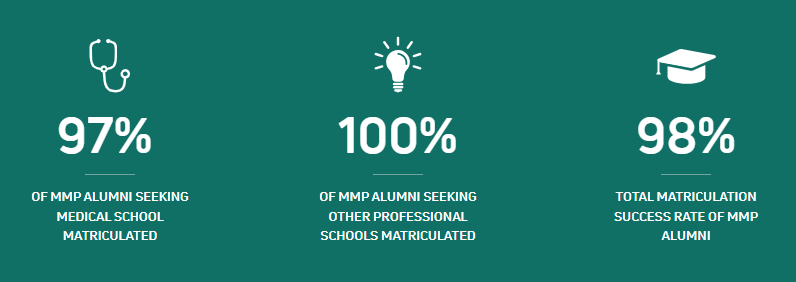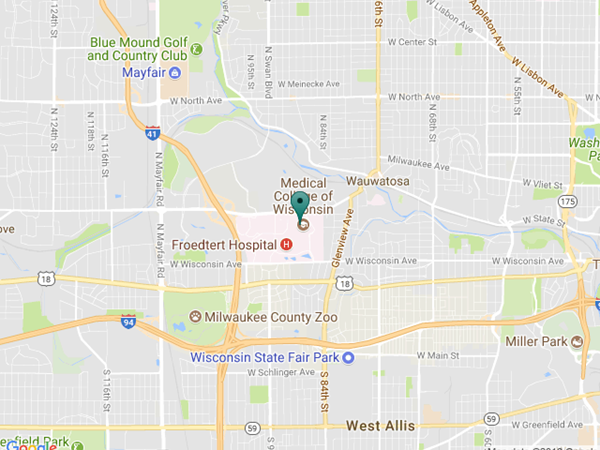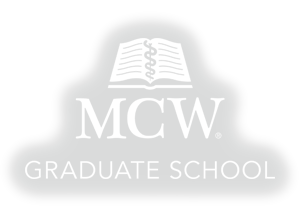Master's in Medical Physiology at the Medical College of Wisconsin

Mission
Why Join the Master’s in Medical Physiology program at MCW?
Medical Physiology Virtual Open House
Important Dates
January 1: Applications open
March 1: Early decision deadline
May 29: Regular decision deadline
Master's in Medical Physiology
About the Program
The Master’s in Medical Physiology Program at MCW is a one-year special Master’s program designed to help college graduates strengthen their academic credentials for medical school and other health professional programs. Our program includes MCW School of Medicine courses and exams , providing students with experience comparable to MCW medical students. Our program also includes MCAT preparation and conditional admissions interviews to the MCW School of Medicine and MCW School of Pharmacy. We maintain a small cohort size to ensure each student receives the personalized academic advising and career development they need to succeed. Graduates of this program have a solid foundation for medical school, other health professional or biomedical research programs, and jobs in academia, industry, or government positions, as supported by our strong placement data
Curriculum

In the MMP program, students take courses with first year medical students (M1) and first- and second-year graduate students. Students also take MMP courses that are specifically designed for MMP students. While MMP students will take the exact same exams with medical students and graduate students, MMP students will be graded on a letter scale (A, B, C, etc.) in order to derive a cumulative GPA for the MMP program.
Medical Humanities (with medical students)
The goal of Medical Humanities is to provide the knowledge, skills, and expertise necessary to promote MMP student development into impactful future physicians, scientists, and healthcare professionals. This course is largely consistent with The Good Doctor course in the medical school curriculum, but with some content and assessments adapted for MMP students. This course includes competencies pertaining to character and professional development, ethics, wellbeing, health equity, communication, and interprofessional practice.
Foundations of Medicine (with medical students)
The goal of Foundations of Medicine is to establish a strong, broad foundation of basic scientific knowledge. This block integrates concepts of biochemistry, cell biology, genetics, physiology, anatomy, microbiology, pharmacology and biostatistics to form a wide base of knowledge related to cell and tissue biology, organ systems, patients and communities, which are applied to solve clinical problems in the context of patient-based scenarios. Learning experiences are reinforced with small group discussions, interpretation of molecular diagnostic tests, and laboratory activities.
Hematology/Immunology (with medical students)
Heme/Immunology is designed to teach the biochemical, genetic and physiological etiology of hematological and immunological pathologies and physiological responses to infection. Basic science content will be provided in parallel to small group case-based learning sessions and histopathology laboratories, which will be designed to emphasize and expand upon the pathophysiology.
Musculoskeletal Skin (with medical students)
The goal of Musculoskeletal Skin (MSS) is to give students a greater understanding of the foundational science processes underlying the anatomy, physiology and pathology of muscle tissue, bones/cartilage and skin. Integrated case studies will examine the development, structure and function of skin, skeletal muscle, cartilage, ligament and bone anatomy through examination of pathology, radiology, immunology, cell biology, pharmacology, anatomy, physiology, and developmental biology.
Gastroenterology and Nutrition (with medical students)
Gastroenterology and Nutrition will educate students in the fundamentals of the anatomy, physiology, pathophysiology, and disease states of the luminal and solid organs associated of the gastrointestinal tract. Learning activities include synchronous and asynchronous didactic sessions, gross anatomy, histology, and pathology laboratory sessions, and small group case-based discussions focused on various gastrointestinal pathologies and disease states.
MCAT Prep
MCAT prep combines training in MCAT study skills, access to MCAT content review, question banks and practice exams, and individualized MCAT advising and tutoring to help you improve your MCAT performance.
MMP Career Development
The goal of the MMP Career Development course is to increase your skills and readiness for medical school and graduate school applications. To achieve this goal, you will be working with your peers, current medical and graduate students, and diverse range of faculty to write an application cycle calendar, personal statement, and CV/resume, and to execute individual and group mock interviews.
Graduate Human Anatomy
The Graduate Human Anatomy course teaches students the structural aspects of the human body and their clinical correlates. Learning experiences are reinforced with cadaveric dissection and a variety of clinical imaging techniques, including plain films (X‐rays), CT and MRI scans. Aside from medical knowledge, the course nurtures teamwork, interpersonal and communication skills, and professionalism.
Ethics and Integrity in Science
This course will cover the basis for understanding the ethical issues related to basic scientific and medical research, including animal and human subject research, fraud and misconduct, and governmental, institutional, and researcher responsibilities.
Reading and Research
Reading and Research is an elective for MMP students. Reading and Research is designed by each student with his/her/their research advisor to focus on readings in literature in the student’s field and to conduct supervised, independent research with Physiology Department faculty.
Organ Systems Physiology
Organ Systems Physiology focuses on an introduction to the classic topics in physiology – the science of regulation and control systems – including the Physiology of Cells, Muscle, Cardiovascular, Pulmonary, Renal, GI, Endocrine, and Reproduction. It will also introduce the students to animal models in physiological research appropriate for the topic at hand.
Special Problems in Physiology
This course will cover a number of physiological topics including hypertension, obesity, cardiorenal diseases and more. The efforts of the class will focus on developing of an understanding of various critical physiological processes and pathophysiological complications. Special attention will be paid to the peer-review process and the development of critical evaluation of manuscripts in different areas of Physiology.
Functional Genomics
Functional Genomics is an elective for MMP students. The course consists of a series of lectures, discussions, and computer exercises, and a practice of writing of a grant proposal. Major topics to be covered include genome sequence, genetic analysis, genome and gene manipulation, epigenetics, high-throughput molecular and phenotypic profiling, bioinformatics, computational biology, and integrated application.
Fundamentals in Neuroscience
Fundamental of Neuroscience is an elective for MMP students. Fundamentals of Neuroscience follows a multidisciplinary approach to current knowledge about the structural and functional properties of the nervous system. The mechanisms of the nervous system are described at the molecular, cellular, systems and complex brain function levels. The course includes lectures, discussion sessions, and seminars. The purpose of this course is to introduce graduate students to the anatomy and function of the human nervous system.
MCAT Prep
MCAT preparation is included in tuition for MMP students.
MCAT prep combines training in MCAT study skills, access to MCAT content review, question banks and practice exams, and individualized MCAT advising and tutoring to help you improve your MCAT performance.
Importantly, MCAT prep is designed by the MMP program, ensuring that preparation is tailored to your needs as an MMP student.
Linkage
The MMP program offers conditional admission interviews to MMP graduates who apply to the MCW School of Medicine and the MCW School of Pharmacy.
MCW School of Medicine: MMP program graduates who submit a medical school application to the MCW Medical School will be invited for an interview provided that their performance in the MMP program has met certain academic criteria, their experiences demonstrate holistic readiness for a career in medicine, and their conduct satisfies our high standards of professionalism.
MCW School of Pharmacy: MMP program graduates who submit a pharmacy school application to the MCW Pharmacy School will be invited for an interview provided that their performance in the MMP program has met certain academic criteria, their experiences demonstrate holistic readiness for a career in pharmacy, and their conduct satisfies our high standards of professionalism. Completion of MMP program courses may satisfy PharmD program prerequisite courses in advanced biology, statistics, college algebra, public speaking, and/or general education, if needed.
Admissions
Dates and deadlines for Summer 2026 enrollment
Submitting your application and all supplementary materials by the early decision deadline (March 1) guarantees that your application will be reviewed for all available seats in the incoming class. After March 1, we will still be accepting applications until the regular decision deadline (May 29). The class size will be capped at 16 students. Once completed, please allow 4-6 weeks for the applications to be processed and reviewed.
Guidelines for admission include a completed undergraduate (baccalaureate) degree or equivalent from an accredited institution, an overall GPA of 3.2 or higher, an overall GPA in math and science of 3.0 or higher. Applicants are recommended to submit MCAT scores if available. MCAT scores are preferred, but other health professional school test scores (e.g., GRE, DAT, or PA-CAT) can be used if MCAT scores are not available. Successful applicants typically have a composite MCAT score of 490 or higher, and/or GRE scores at or above the 50th percentile in each category. Test scores are only valid if they have been completed within 18 months of the time of application.
Application Review - selection of candidates will be based upon overall undergraduate performance (grades, GPA, grade trends), letters of recommendation from three individuals (two or more must be from university/college faculty), MCAT scores (and/or other health professional school test scores), a written personal statement defining interest in this program, and answers to a few short answer questions. In-person or phone/online interviews will be requested on a case-by-case basis but may not be required for admission. Once the class size is reached, qualified students will be placed on a waitlist. If accepted students are subsequently accepted to medical school or decline to matriculate into the MMP, wait-listed applicants will be offered admission until the maximum class size has been reached or Summer courses have begun. Written notice of admission into MMP will be provided solely by the Dean of the Graduate School of Biomedical Sciences at MCW.
Acceptance into the Master's in Medical Physiology Program will be based on the review of all required written materials submitted by the applicants, and outcomes from interviews (if applicable). Acceptance will only be granted if all required materials are submitted by the stated deadlines.
Recommendations for application
- MCAT scores (preferred) or other health professional school test scores (GRE, DAT, or PA-CAT if MCAT scores are not available)
- Composite score of 490 or greater on MCAT and/or GRE scores with Verbal >50% and Quantitative >50% (NOTE: MCAT preferred)
- Overall undergraduate GPA not less than 3.2
- Science GPA not less than 3.0
- Official transcripts from all previous undergraduate and graduate institutions.
- Letters of recommendation from three individuals (at least two must be from university/college faculty).
- MCAT scores (preferred) or other health professional school test scores (GRE, DAT, or PA-CAT if MCAT scores are not available)
- For MCAT scores, please include the month and year that the MCAT was taken. To submit your MCAT scores, please send an email to gradschool@mcw.edu with a copy of the MCAT report that includes the ID number as well as the verification code. After the MCAT report is received, the Graduate School will verify the scores on the MCAT website.
- To submit GRE scores, arrange for an "official" test score report for the Graduate Record Exam (GRE) to be sent directly from ETS to the MCW Graduate School of Biomedical Science. Note our institution code is 1519, and our department code is 5199.
- Written personal statement describing your educational goals and how this program would help you achieve your goals (included in the online application form).
- Written responses to several short answer questions related to your education, interests, clinical contact and other experiences, and career goals (included in the online application form).
- Application fee of $50.
During the application cycle, the MMP program will accept applications from US Citizens, US Permanent Residents, and DACA recipients and international students. International students need to submit a completed MMP application by our early decision deadline.
Placement Data
Most MMP graduates apply to medical schools (MD and/or DO) or other professional programs during their gap year after completing the MMP program. Our graduates have a high level of success in placement into professional programs. MMP graduates seeking admission to medical school have a 97% success rate, and those seeking admission to other professional programs (dental, pharmacy, physician assistant, anesthesiologist assistant, or PhD programs) have a 100% success rate. Our total matriculation success rate is 98%, and the majority of MMP alumni (greater than 90%) matriculate to their program of choice within two years of graduating from the MMP program.

Tuition and Fees
Graduate School Tuition and Fees
Graduate School Tuition and Fees
Learn more about graduate school tuition and fees
Late Fees
There will be a $100 late registration fee for anyone not completing registration by the date indicated on the schedule each semester.
There is also a $250 late payment fee for tuition not paid on time according to the Tuition Payments policy in the All Student Handbook (PDF).
Late payment fee is in addition to any late registration fee.
Faculty

A message from MMP program director, Denise Cook-Snyder:
Thank you for your interest in the MMP program at MCW! It has been my privilege to serve as director of the MMP program since 2021, and to have supported pre-health students for more than 10 years. It is my responsibility to ensure that all MMP students have the opportunities they need to be successful in achieving their professional goals, whether that’s medical school, graduate school, other health professional schools, or biomedical jobs. I take great pride in our MMP student success, and I invite you to explore our website to learn more about how the MMP program can support you.
Please don’t hesitate to ask questions!
You can reach me via chat on the MMP website, email mmp@mcw.edu, phone (414) 955-2352, or by booking an appointment.
Alumni
Master's in Medical Physiology Program Frequently Asked Questions
General Program Information
Application and Admissions
Curriculum
Tuition & Fees
Benefits of the MMP Program
Follow Us On Our Socials
Stay up-to-date on events, news, and other happenings in the MCW Graduate School!




